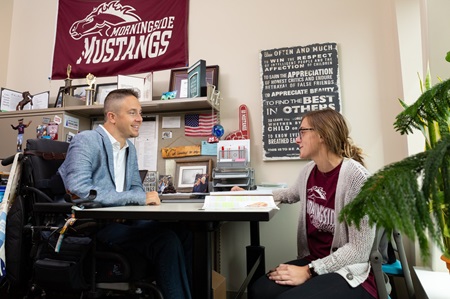(Radio Iowa) – A University of Iowa study finds package delivery companies would save bundles of time and money if their delivery truck drivers spent more time on foot and less time looking for parking spots. Ann Campbell, a U-I professor of business analytics, says she and her team have been researching ways delivery routes could be optimized, especially in urban settings. “The current mode is a lot of park one spot, walk to just the one address, go back to the vehicle and drive again, or go just maybe next door before driving again,” Campbell says, “where this would recommend walking to more, because the speed of walking is fast enough that it makes up for the time it takes to park when you’re in a very busy, congested environment.”
In many smaller Iowa towns, parking isn’t a big deal for delivery vehicles, but Campbell says parking is a premium even in Iowa City, which isn’t a metropolis. “But have you tried parking from eight to five or on a football weekend?” Campbell says. “A truck is a large size vehicle and often doesn’t work for regular spots. There’s only a few spots to park in and finding a place that is legal and safe is quite a challenge.” The study found delivery times could be cut by about 50-percent if companies designed routes built around walking, allowing drivers to make twice as many deliveries each day. Technology continues to emerge that promises to speed up deliveries, too, like having flying drones deliver packages, though Campbell says drones have drawbacks.
“They’ve been proven to not be the greatest technology in all kinds of weather,” she says. “They tend to work better when it’s dry, not raining and snowing, because that’s kind of not-so-great on the flying power of the drone. We’ve learned that they work better in certain conditions than others.” In recent years, at least one national chain has touted the development of heated, rolling robots that can cruise a hot pepperoni pizza right to your door. “The robots do exist in certain places to deliver your pizza, but it needs to be very smooth sidewalks,” Campbell says. “They can’t really handle construction and lots of pedestrians and crossing highly trafficked roads. So where you tend to see robots a lot is on college campuses.”‘ Those haven’t made it to Iowa City, at least not yet.
The paper Campbell co-authored was published in the journal Transportation and Logistics Review.





